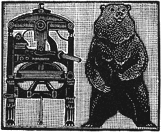| |
||||||||
Books in Print

Wood engraving by Colin Paynton
(from The Chimes, 1985)
Weathers:
A Selection of Thomas Hardy’s Poems
October 2025
Loose Canons Two:
E A Robinson: Ben Jonson Entertains a Man from Stratford & Other Poems
February 2025
Loose Canons Three:
Edward Thomas: The Child on the Cliffs
April 2025
Loose Canons Four:
Merrill Moore: Blue & Yellow Evening at Ostend
October 2025
Pastoral Elegies
Thomas Gray’s
Elegy written in
a country churchyard
& Oliver Goldsmith’s
The Deserted Village
Spring 2024
|
Click on pamphlet covers |
Loose Canons Two:
E A Robinson: Ben Jonson Entertains a Man from Stratford & Other Poems
The second in an ongoing series of pamphlets celebrating and reintroducing poets and poems unfairly neglected or forgotten
February 2025
E A Robinson’s work has a documentary alertness about it, especially in his portraits of characters in Tilbury, a town he created to house the folk who inhabit many of his poems and exemplify his convictions about humanity. His poems were widely read and greatly praised during his life, and for some time after: he won the Pulitzer Prize for Poetry three times. Yet particularly after the Second World War his reputation shifted largely into the academies, and he became a figure of the past to most readers – especially to the new generation of poetry readers from the 1950s and ’60s who espoused the boisterous, gangling styles of Ginsberg, Kerouac and the Beats, the casual familiarities of Frank O’Hara or the self-consciousness of Black Mountain and the New York School. For all the unquestionably fine qualities of this ‘New American Poetry’ (as Donald Allen titled his seminal anthology introducing these poets to the public) Robinson’s work was too civil, thoughtful, and wise to survive in such company. His calm, considered voice would have been shouted down, and his observations passed off as inconsequential.
Yet Robinson continually hits the mark in portraying his people. Aaron Stark, the miser, with his eyes ‘like little dollars in the dark’; Reuben Bright, the butcher who, when told his wife would die, ‘made the women cry to see him cry’; and Miniver Cheevy, who lived entirely in the past and ‘loved the Medici / Albeit he had never seen one’, yet ‘would have sinned incessantly / Could he have been one’, are all recognizable people, not mere caricatures. Ironically, ‘Richard Corey’, one of Robinson’s astute portraits which had survived in high school textbooks (and was inevitably ignored by most) rekindled some small popular interest in his work in 1966 when Paul Simon wrote a song setting an adapted version of the poem about the man who ‘glittered when he walked’ and was ‘everything / To make us wish that we were in his place’, but who ‘one calm summer night, / Went home and put a bullet through his head.’ Several of these character studies in sonnets and lyrics are included in this 20-page pamphlet.
The title poem of Loose Canons Two, ‘Ben Jonson Entertains a Man from Stratford’, is one of Robinson’s several dramatic monologues, a form or device he inherited from an occasional tradition particularly evident in 19th century English poetry, and notably a feature of Robert Browning’s work. This poem, written in fluid, colloquially adroit blank verse, is spoken by the playwright Ben Jonson, historically a close friend of Shakespeare who nevertheless found fault with certain elements of his writing and – at least in the context of Robinson’s poem – of his character. The unidentified and fictional ‘man from Stratford’ visiting Jonson in London is clearly someone who also knows Will Shakespeare personally, and Jonson’s discussion of their mutual friend is illuminating and persuasive in itself; we are not, however, made aware of his guest’s responses.
In 1597, at the age of 33, Shakespeare bought New Place – a matter of historical fact – the biggest and most costly house in Stratford, with a courtyard, two barns, and two orchards, and it is this fact that spurs the conversation in the poem. Jonson’s continual references to Shakespeare’s purchase, perhaps partly motivated by jealousy, lead him to comment on Shakespeare’s motives in buying it (conceit? self-aggrandizement? social position?) and to various impressions of Will’s character such as his reticence, his depth of perception, and the sometimes puzzling nature of his friendship. In some ways, Robinson’s poem is one of the more revealing discussions of Shakespeare’s possible personality ever written, going beyond professional biography to a poetic perception – not only of Shakespeare, but of Jonson himself – the equal of Robinson’s portraits of his own fictional dramatis personae. We think it will appeal.
![]()
Loose Canons Two: E A Robinson : Ben Jonson Entertains a Man from Stratford & other poems is published in an edition of 120 copies. Printed in Poliphilus & Blado with Caslon Antique for display, hand-set by Apollonia Elsted and printed on Zerkall Cream laid paper by her and Lea Sánchez Milde, it is sewn into wraps of St-Armand Canal paper. 20 pages. C$120.
Visit our Ordering page to place an order for this title.
